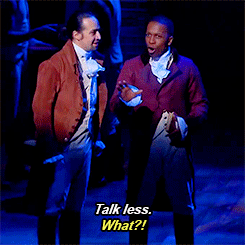
At the risk of flattering myself: From reading my writing, you’d have no way of knowing how hard it is for me to talk.
It’s not hard for me to form words. I’ve never had any developmental delays, cognitive delays, speech delays, or mechanical or neurological issues that might interfere with me talking. In casual conversation, I’m usually able to more or less hold my own. With a degree of effort. Public speaking, I can usually pull off with a considerable degree of effort. Concepting? Writing? Creating? It’s awesome. It’s the best. And people pay me to do it! But… talking? Like, with my face hole?
The inside of my brain is, actually, much like what you see here, and then some. For every comma, em dash, or parenthetical I put on the page, I have three more in my head. It’s not that I don’t have thoughts, or can’t organize my thoughts — I have ALL THE THOUGHTS, and deciding which ones to let out of my head in a limited amount of time is a struggle. Ask me a question, and I know the answer to it. But I don’t know how to say the answer. There’s so much in there. What needs to be included? What needs to be left out? What needs to go first? What’s the best way to convey the message in a way it’ll be understood? (And, if I finally manage to get started, where do I stop? How do I stop?) It’s a fine thought process to go through as you sit down to write copy, but when a client asks a question during a presentation, they don’t have time for you to run back to the office right quick to run through a couple of drafts.
(For the record, people with ADHD get a lot of flak for not thinking linearly, but that’s unfair. Yes, maybe I’ll be making coffee, and deciding to put some cinnamon in my coffee ‘cause it’s fall, and that makes me think of Cinnamon Toast Crunch, which makes me think of Cap’n Crunch, which makes me think of Captain America, which makes me think of American Psycho, which makes me think of Psycho, which makes me think of The Birds, which makes me think of The Byrds, and yes, now I’m sipping my coffee and humming “Turn, Turn, Turn,” but THAT, my friend, is called a LINE.)

It sucks, because I know I can sound… less than together, on occasion. Not usually, but on occasion. I know I can sound unprepared (despite extensive preparation). I know I can sound airheaded, fumbling for words or, alternately, barfing them out in a flood while I mentally scramble for an endpoint. One of the biggest challenges for me, as a freelancer and as a senior-level creative, is that the further I progress professionally, the more I have to talk to people in stressful situations. And the more I have to do that, the more chances I get to appear completely incompetent with words in front of someone who is, ostensibly, going to pay me money to be good with words.
Writing right
I am good with words, though. Where it counts.
Writing, even writing on extremely tight deadlines, gives me an opportunity to say it right. When I’m writing and I get stuck for a word, there’s no standing there with waving hands trying to drag the word “rationalize” out of my increasingly uncooperative brain while the person I’m talking with waits patiently (or not so patiently) — I can just write [VERB], all caps and in brackets, and keep going, and circle back around once the rest of the ideas are on the page. It doesn’t matter what order the ideas come out in or how they connect, because I have time to make it work.
Give me even just a little bit of time to think, to go through the process of deciding what needs to be said and how it needs to be said, picking out the right words to use, doing a tiny bit of re-reading and editing, and I can make the words on the page match the image I had for them in my head, and I can produce great things. I’ve made people laugh, cry, give money, buy soft drinks, and change opinions they’ve held their entire lives. I can do all that. It’s right here in my head. It just needs to come out on the page, not out of my mouth.
Making it work
Naturally, as someone who’s been dealing with the disconnect between my brain and my mouth for nearly four decades now, I’ve developed workarounds. When I know I’m going to have to speak, I start by writing — I script, and I edit, and then I memorize, and then I rehearse like a Shakespearean actor until it sounds like I’m not reciting an audition monologue for the role of President of the Local AAF Chapter Making Announcements at the Beginning of a Meeting. Hell, I mentally rehearse scheduling a vet appointment for my dog before I dial the number. With a couple of beta blockers to ease my nerves, I can make it through a client presentation or a professional talk pretty well, thanks to the wonders of rehearsing. The inevitable Q&A at the end is, of course, another story.
When I speak, I use my hands as much as I do my mouth. That is, unfortunately, not so much a coping strategy as a tic, and I know it can be distracting, and I try to keep it to a minimum, but I’ll admit, I don’t try as hard as I could. A nice, broad arm gesture can be a way of holding time and maintaining momentum without having to resort to “um,” and if I have to bodily drag the words out of my brain with my bare hands, that’s what I’ll do. In the era of COVID-19, I’ve learned to stage my Zoom calls to accommodate my gestures — I discovered during one talk I gave that the traditional collarbones-and-up shot left my windmilling hands flitting in and out of the frame, and I figured if I couldn’t get my arms to stay still, at least I could let my audience know what the hell was going on with them.
I use metaphors and movie quotes more or less as a second language, letting context do the heavy lifting so I don’t have to.
And sometimes, in the right company, I’ll just go ahead and put things in brackets. If you’ve ever heard me say, “The — when you’re taking advantage of someone, but it’s more — it’s — ugh, ADJECTIVE” and move on, congratulations — you’ve seen the inside of my head. Sometimes, the word will come to me, and I’ll circle back to fill it in, and other times, I’ll just let it go, letting the conversation drift imperfectly off into eternity as whatever word was supposed to go there dies on the tip of my tongue.
Not getting political here.
(But.)
I was inspired to write this post by an article in the Atlantic about Joe Biden — not Joe Biden the politician, but Joe Biden the man who has overcome, and still occasionally struggles with, a stutter. He’s been more open about the former than the latter, which is understandable — it’s always easier to talk about a past victory than a current struggle, and certainly in the home stretch of a political campaign, showing vulnerability is rather the Choice.
The thing that jumped out at me in the article was the account of what appeared to be (and, for what it’s worth, might really have been) a Biden gaffe during a town hall last August. Clearly searching for the word Obama, Biden ultimately went with my boss, prompting pundits on the right and the left speculate that Joe Biden, in clear cognitive decline, couldn’t even remember Barack Obama’s name. John Hendrickson, author of the article and himself a stutterer, proposed a far more likely scenario: Biden knew Obama’s name but was struggling to say it. And, as people with stutters are told to do, he swapped out a word that wasn’t coming out for one that would, and he moved on with the conversation. He didn’t have the option of just writing [THE LAST PRESIDENT] and moving on with the town hall, so he did what he could. That commentators would later be a collective dick about it was beyond his control.
I can’t say I know what it’s like to live with a stutter — there’s a lot of stigma and bullying surrounding it that I haven’t had to experience. But having something in your head that you can’t get out of your mouth? Having to settle for something less than right even as the right word is right there? Knowing that your world outside is going to have misconceptions about your world inside because you can’t get the two to connect? I know what that’s like. And it sucks. A lot.
He looked at me like I was stupid. (I’m not stupid.)
(See how much easier it is to just let Lin-Manuel Miranda do my job for me?)

Mention of a prominent political figure during an election notwithstanding, this post isn’t about politics — it’s about compassion. (It’s also, now that I glance back through it, not really about advertising either, but whatever. It’s my blog.) And it’s about being aware of our industry, and the people around us in our industry, and the world, and what the world looks like.
In advertising, we learn (or, at least, I learned) about different types of noise — psychological, environmental, physical, and semantic. We learn that there are lots of different ways that the world can interfere with a message as it’s sent by a sender and then received by a receiver. We know how careful we have to be to make sure others are understanding what we’re saying as we intend them to understand it. And if it’s something we, as creative professionals, have to make an effort to accomplish, we should be able to understand how it might be hard for others.
Speech impediments. Language barriers. Cultural barriers. Communications issues associated with neurodivergence. We make judgments based on the output of one specific method of communication, even knowing how imperfect it is, and then we apply that judgment to completely unrelated aspects of a person’s value. And it’s kind of [ADJECTIVE], honestly, for us to assume that we’re processing the message properly, that our own personal biases and misconceptions aren’t also getting in the way and making us think the problem is entirely on the message-encoding end. And for us to assume that the person we don’t entirely understand wouldn’t be understood perfectly well (better than we are, even) by others.
What, and who, do we miss out on when we run up on those barriers and decide there’s nothing on the other side? What sort of creative, strategic, or interpersonal brilliance goes ignored because obviously a person who stammers when they talk can’t still think smoothly? Whether it comes up during the hiring process or when we’re trying to communicate with our audience, our assumptions about other people can cause us to miss opportunities to make valuable connections. That’s bad news for us as communications professionals and as people who, ideally, want to make the world better.
And on a personal note, thank you to all the people I can ADJECTIVE. I wish I could give you the words I’m looking for, because you’re awesome and deserve only the right words. But failing that, I’ll give you my inability to find the right words, and just so you know, the word I was looking for there was “mercenary.”

Well, shit.

